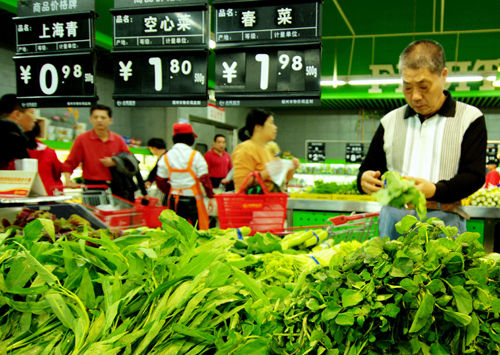Inflation to further cool down in 2012
 0 Comment(s)
0 Comment(s) Print
Print E-mail
China.org.cn, January 3, 2012
E-mail
China.org.cn, January 3, 2012
China's CPI will see further downward movement in 2012 as the effect of imported inflation wears off and the government maintains its prudent monetary stance, analysts have said.
However, analysts also expect long-term inflationary pressure to linger on, urging authorities not to let their guard down.

"Price rises will slow down markedly in 2012 as the economy downshifts, food prices retreat and imported inflation tapers off," according to the Bank of China's 2012 first-quarter economic outlook report.
The report predicted that the consumer price index (CPI), a main gauge of inflation, will rise around 3.5 percent in 2012.
It forecast the gross domestic product (GDP) value to grow about 8.8 percent, further moderating from 9.1 percent in the third quarter of 2011.
Zhuang Jian, a senior economist with Asian Development Bank, anticipated a downward trend in the overall price level in 2012 as a result of diminishing carryover effects and the government's prudent monetary policy direction.
"There might be a certain degree of fluctuation in monthly figures, but the overall CPI growth will stay around 4 percent," he said.
Lian Ping, chief economist with Bank of Communications, said the CPI in 2012 will reach around 3 percent, citing declining food prices -- which factor greatly in the CPI calculation -- as well as falling commodity prices on international markets and prior monetary tightening measures.
The central bank had hiked banks' reserve requirement ratio (RRR) six times and the benchmark interest rate three times in 2011 to fight inflation before cutting the RRR by 50 basis points in December.
Despite easing inflation, long-term pressures remain, forcing policy makers to keep an eye on price rises.
Commodity prices may run high because of future quantitative easing measures as global central banks unleash liquidity to stimulate the sluggish economy, according to the Bank of China report.
Analyst Lu Bin with SCI, a Chinese commodity information portal, said crude oil prices might spike if instability in the Middle East worsens and severely affects oil supplies.
Lian pointed to higher labor costs, resource product price rises and land shortages as long-term factors that will bolster inflation.
Macro-control policies should closely follow the inflationary trend and must not hamper efforts to balance supply and demand and facilitate the distribution of goods, he said.
China's CPI eased to a 14-month low of 4.2 percent in November from the year's peak of 6.5 percent in July. It hit 5.5 percent year-on-year during the January-November period, well above the government's full-year target of 4 percent.
Go to Forum >>0 Comment(s)
 Add your comments...
Add your comments...
- User Name Required
- Your Comment
- Racist, abusive and off-topic comments may be removed by the moderator.





